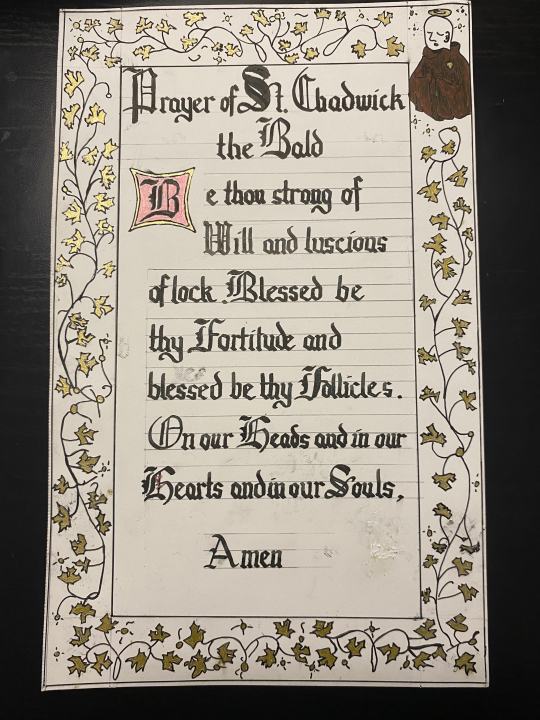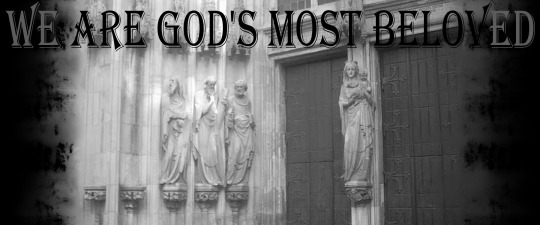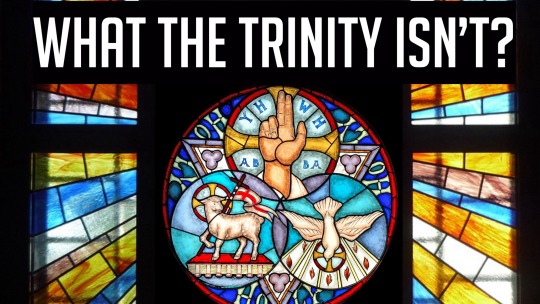#Building Your Theology
Text
Church is More Than Just a Sunday Show
Ah, so you’re telling me that church shouldn’t just be a “check the box” activity for spiritual maintenance? Well, according to Ephesians 4:13, we’re supposed to aim for unity, knowledge, and the fullness of Christ. And Philippians 3:15? Yeah, it’s for the mature thinkers, not the spiritually sluggish.
Colossians 1:28 and Hebrews 5:14 are dropping truth bombs about proclaiming, warning, and…

View On WordPress
#Blogs#Brendon Naicker#Bristol church#bristolchurch#Building Your Theology#Christian Doctrine#Churches Unite#discipleship#doctrine#hell#joburg church#joburgchurch#London City Church#salvation#Spiritual growth#Swindon#Swindon Church
0 notes
Text
very impressed by this author being able to make this children's pegasus book a completely intolerable christ allegory
#what i did expect: a mediocre wings of fire rip off#what i didn't expect: being neck deep in american-christian theology#had to stop reading after she began explaining why it would be immoral for the christ!pony to heal everyone a c t u a l l y#okay excuse me while basic universal health care waters down my life force or whatever improve your morals and also your world building#🙄
3 notes
·
View notes
Text
What Do You Believe?
Questions of Faith
I once had a friend, Benny, a birthright Quaker, who had over the course of his life become an atheist. After battling lung cancer for several years, his body started to weaken, and he was put on hospice care. One afternoon as I was sitting by his bed, I asked him what he believed awaited him after death. He said he thought it would be peaceful. like lying in a mountain…

View On WordPress
0 notes
Text
Get Your Ed Schneider Books on Amazon
Finding Your Next Pastor https://a.co/d/7JL9itn
Absentee Shepherd https://a.co/d/cAAn3Go
A Note Worth Knowing https://a.co/d/4fm9v0g
Building Better Kids https://a.co/d/3cAf2XX
Honest Christianity https://a.co/d/asDUmP8
Saving the Christian Church from Itself. https://a.co/d/6Z2l8Px
Being Reformed in a World of Religious Diversity https://a.co/d/0JNaBH3

View On WordPress
#A Note Worth Knowing#Absentee Shepherd#being Reformed#Building Better Kids#Christian Education#Christianity#Essential Truths#Evangelism#finding your next pastor#honest christianity#Leadership#Pastor Ed#Pastoral Training#Rev. Ed Schneider#theology#Transformation
0 notes
Text
okie i made an art but there is some context to it
so my sister was studying in the haunted theology building on her college campus because it was open and it had rooms to study in .
and since it is a theology building lots of people who like catholicism go in there. so my sister finishes working on her paper or whatever and it's like 2 am and she sees a piece of paper in the hallway that says "what is your favorite saint?" with a bunch of names of catholic saints that people like that they put on there. so my sister (an atheist) makes up a fake saint name (st. chadwick the bold) and writes it on the paper.
however, since it was darkish and lateish she accidentally wrote "bold" in a way that it could be misinterpreted as "bald"
now the next day she's having a movie night with friends and tells them about it and one of them draws a very reverent, very bald monk-saint on a whiteboard . and then they make a prayer to st. chadwick the b[o/a]ld
and then when she told me about it this weekend i thought i could use it as a chance for calligraphy / gothic graphic design practice so i made this

behold
#ok some notes abt its imperfections:#yeag i made the capital s in Saint too weird (i didn't like it at first then tried to fix it then failed)#and it's kinda blank (i wasn't sure what else to put)#and it's kinda smudged#and i didn't erase the drafting lines because i thought it would further smudge the ink because i didn't want to wait for it to dry#because my sister had to leave soon and get back to campus#and also the B at the beginning of the “prayer” is very weirdly colored and designed i should have chosen a better color and design#calligraphy#art#saints#oh also#i was writing the dies irae with my calligraphy pen and i accidentally imprinted some letters into my finger with ink#so if you see some really light smudged letters in between the lines that is because i put my finger there and accidntally stamped those#letters into the paper#but yea it's really bad i just wanted to share it with somebody
603 notes
·
View notes
Text
According to Matson, 39, his “disclosing,” as he describes it, is a moment years in the making. He offered his story as indicative of the often difficult path for trans Catholics, including those seeking life as a religious — a category that includes brothers and nuns.
“I am currently based in the Appalachian mountains of eastern Kentucky,” he wrote in an email to friends and supporters on Sunday. “I live in a hermitage at the top of a wooded hill, which I share with my German Shepherd rescue, Odie, and with the Blessed Sacrament, which was installed in my oratory shortly before Christmas.”
[...] Matson approached a canon lawyer to discuss his options and was told that only two aspects of Catholic life were categorically off the table: marriage and the priesthood. According to Matson, the canon lawyer recommended being upfront about his status as a transgender man in any vocational conversations with church leaders and mentioned the role of a diocesan hermit, which could prove less challenging than enlisting with an existing religious order.
[...] What followed was roughly a decade of searching and no small amount of rejection. Living in the United Kingdom while pursuing a master’s degree, and later a Ph.D. in theology, Matson entered a vocational discernment program and approached the Jesuit order to ask if he could join.
“They said, ‘No, we just don’t see how this would work for us,’ which was crushing, because that’s where I felt called,” Matson said.
[...] “I thought, well, if I can’t find a religious community to sponsor me, maybe what I need is a bishop,” Matson said.
A priest friend recommended different bishops to contact, beginning with Stowe, who was emerging as a leading voice among Catholics calling for a more tolerant approach to LGBTQ+ people. In 2020, Matson sent Stowe a letter, conveying his status as a transgender man, his vision for an artists’ community and his pull to religious life.
Stowe wrote back immediately, expressing his openness.
“It was an enormous relief,” Matson said. “I was in tears. I felt my hope revive.”
[...] Matson vented his frustrations to Stowe and his spiritual director, saying he wanted to speak out. But he said he was advised to first “build a foundation” in religious life for several years.
During that time, Matson had an experience that shook him. Attending a friend’s play in his religious habit, he was approached by a student who identified as trans and nonbinary. After asking if Matson was a monk, the student said they were raised Catholic, but that their parents had rejected their identity, and the student felt like they “don’t have a place in the church anymore.”
Matson responded by saying there were people in the church who would support the student, and Matson prayed with them, asking God to show the student how they are “wonderful the way you’ve made them.” The student, Matson said, grew emotional, thanking the hermit profusely and saying, “No one from the church has ever affirmed me for who I am.”
[...] As for ever leaving Catholicism itself, Matson bristled at the idea, calling the church “my family.” “I’m Catholic,” he said. “I became Catholic after I transitioned because of the Catholic understanding — the sacramental understanding — of the body, of creation, of the desirability of the visible unity of the church and primarily because of the Eucharist.”
At the very least, Matson said, he hopes going public will spark dialogue about his fellow transgender Catholics, a discussion he believes can enhance unity among the body of believers.
“You’ve got to deal with us, because God has called us into this church,” he said. “It’s not your church to kick us out of — this is God’s church, and God has called us and engrafted us into it.”
#m.#christianity#catholicism#trans devotees#trans theology#trans spirituality#trans christian#trans catholic
249 notes
·
View notes
Text
Professional Monster Removal
So, you've been hired to clear out a monster (or monsters) infesting a building in (or around) a modern city. What do you do?
The first problem is that you can't trust what your client tells you. Not in the sense that you think they're intentionally lying to you, but rather, they don't know what they're talking about.
If they tell you it's a vampire, that's basically meaningless. As myths go, vampires are more of a catch all for a staggering number of monsters from folklore, and while you wouldn't want to deal with most of those critters, your options for disposing of them (or even identifying where they are in the building, and assessing how dangerous they are) are far more picky. It's a bit like working as a normal exterminator and when you ask what the client needs removed they only offer, “it's furry.” Yeah, that's not helping anyone, buddy.
Werewolves aren't much better. The modern bipedal wolf monster is basically a Hollywood invention, dating back to the mid-20th century. There's absolutely no folklore support for it. That doesn't mean that in your world that flavor of nine-foot tall snarling deathbeast isn't a reality, but it's going to be hard to research. More often, werewolves were humans who took the form of a wolf, usually through some form of magical ritual. Knowing what that ritual is would be critical to identifying and eliminating them. Of course, this does come with the problem of leaving behind a very human looking body (in some cases), and that could be an entirely different problem, depending on exactly how well job is.
If they tell you it's a demon, that's almost more worthless than telling you it's a vampire. First off, there is no way to know that they've actually got a demon, and not just some random spirit. If they do have a demon, I hope you've brushed up on your advanced theology, because this is going to get extraordinarily messy. And, there's a very real danger that whatever you've run into has the capacity for completely unmaking small parts of reality. Or it could just be an unusually malicious house cat. Really, demon is even more of a catch all term for, “something we don't understand, but we're pretty sure it scares us.”
If it's fairies? Run. Just run. You're not getting paid enough for this, they can have their deposit back. It'll be fine. They're smarter than they look, and way more malicious and vindictive than you realize.
Just walking away is also pretty good advice for any esoteric, “list of rules,” you may get handed. Sometimes, this is pretty obvious safety considerations, like don't wander around in darkened rooms while the critter is loose, but when you start seeing things like keeping to a schedule, that's a very good sign that, either, whatever you're dealing with is sophisticated enough that some simple rituals and a catch pole will not get the job done. Or, alternately, someone (probably your client) is using you as bait, or planning to feed you to the critter. This overlaps pretty strongly with the warning about fairies above, the Venn diagram isn't a perfect circle, but there's a lot of overlap.
Now, this doesn't mean you should ignore your client, but it does mean, you're going to need to do a lot of footwork after they hire you. This is not the fun kind of research. If they say vampires, you're going to need to be conversant in the many, many, vampire myths throughout human history. Sometimes you can shoot them. Sometimes you need silver and garlic. Amusing, on the cliché of, “forget all you know about vampires...” there is one element of folklore that actually doesn't exist; vampires don't need your permission to enter a dwelling. Now, a lot of vampires are extremely obsessive compulsive (yeah, this is the hilarious moment where you realize Sesame Street's Count has a legitimate grounding in folklore), so, they may want that invitation for psychological reasons, but it's not a mystical barrier that will protect you. Get them angry enough and they will forget themselves, cross the threshold, and rip you to pieces. (Though, in some cases, churches and temples may repel them. It goes with the holy symbols thing in general.)
That said, the holy symbols isn't specifically a vampiric vulnerability, more just a general ward against monsters, when it pops up. So, this is one to be very cautious of, but it can be useful in a lot of situations if you're receptive to that.
When you're doing your initial walk through, of the residence, keep an eye out for certain tells. You'll pick this up with practice. The direct signs of the critter are always nice, but finding secondary evidence of regarding the site's residents shouldn't be ignored. Keep an eye out for large amounts of esoterica, evidence of objects having been recently removed from the site (or recently added to it), evidence of ritualistic practices (often these will originate from the human residents themselves, rather than the critter, but, obviously, that's not always the case), and other anomalies. You're not just looking for tufts of fur, or forensic evidence, you also need to know why the critter is there.
So, you've identified your pest, hopefully. Under the best possible circumstances, you should now have a roadmap for dealing with these things. Here's the bad news, in some cases, that won't actually give you any tools to deal with it. A distressing amount of folklore will tell you how to avoid dealing with the critter in the first place but then washes its hands of what to do after the critter has been provoked.
Worse, and more frustratingly, folklore will sometimes give you bad information. Yeah, the biggest problem with folklore is, the more dangerous the critter, the less reliable your information will be. If someone offers you to clear out a nest of crawlers, my advice would be to not do it alone, and don't get too attached to the people you work with. There is no reliable folklore on those things, and 99% of the, “lore,” that does exist is internet fiction, written by people trying to spook each other out. As for sifting out that last one-in-a-hundred? Good luck.
This brushes against a related topic, you cannot trust research you pull off the internet. Obviously, things are a little different when you're digging through well documented myths, but when you start getting into more esoteric topics, the signal to noise ratio hops off a cliff. This doesn't mean the internet is useless, it can be useful for a brief overview (if you have the time to sort things out), and of course it's amazing for communicating with your colleagues. However, expect that when you need to dig into local folklore, you're going to need to spend time in the city's libraries, digging through books no one cares enough to scan and post online. For the most part, newspapers have been saved and uploaded, though if you're in the middle of nowhere, you might run into a small town paper that hasn't kept up to date.
So, what do you need to do? Remember that your job is to remove the errant critter from the site, not necessarily kill it. (Try to avoid those stipulations when you can. It can result in really unfortunate situations when you're dealing with something that literally cannot die.) Prioritize elimination in cases where the creature cannot be moved, or will return to the site regardless what you do, but remember you're getting paid to remove it, not to play hero, and you're certainly not getting paid enough to die over a spelling error in someone's circle of protection.
This brushes against a (hopefully) rare problem; amateurs. Yeah, it doesn't matter how much research you do, if your perfectly baited trap gets trampled by some bumpkins who broke in with shotguns and flashlights because they heard some monster was on the loose. Mercifully, these guys are a self-solving problem more often than not. If the critter kills them, then they're not your problem. In some rare cases, amateurs can even be useful, either as bait, or as a new vessel to get the critter off the site and make it a problem for someone else. If that sounds callous, remember that between their poor trigger discipline, misplaced hero complex, and unpredictability, they're more dangerous to you than the monster you're trying to evict. Sure, a century old specter that preys on hope is going to be harder to kill, but these guys are just dumb enough to shoot you in the head if you startle them. Or if they get it in their heads, somehow, that you're the one responsible for the infestation in the first place.
If you're, “lucky,” enough to get repeat business, that's probably a bad thing and the client is not going to be happy about it. In these specific cases, (assuming it's actually a new critter, and not a case where the original one wandered home after being released somewhere distant), your priority changes to identifying what brought the creature back here. Some critters are extremely territorial, and will return home no matter what you do (these are times when you really do need to find a way to permanently eliminate it.) However, if various critters of the same variety found the place appealing, presumably independently of one another, then you need to identify why. Again, this going to take some research, and you might even need to bring in a specialist (if you have access to one.) These kinds of situations can be really frustrating because the client is likely to be pissed with you over the new infestation, and believe its due to your incompetence, not because they didn't disclose critical information the first time round.
Checking city records regarding the place, even land claims and the history of a place become significantly more important on a return visit. (Now, if you're being thorough, you should have checked this the first time, and sometimes you'll even have time to, but if we're being honest, that stuff is rarely relevant, and you won't often have the time to dig through city records.) On the bright side, in the 21st century, a lot of those kinds of records are now available online, and free, so the days of wandering around in some sub-basement of city hall are (mostly) a thing of the past.
This is just napkin math, but figure that about one in four infestations can be traced back to a human cause. Either someone moved into the critter's territory and it's trying to drive them out, someone did something “very bad” and now they have a critter focused on them, or (worst of all), someone deliberately brought the critter here, lost control of it, and now wants you to remove it. The first two can result in repeat business if you simply remove (or even eliminate) the infestation, first time around. The third can also result in repeat business as well, but with a critical tell, the client's going to be fine with bringing you back. This isn't necessarily a red flag, but it is something to be cautious of.
Note that, in cases where the critter is focused on hunting down a specific individual, it may be in your best interest to simply stay out of its way. Actively helping the creature is a major liability risk, as you'll now be implicated in their death, but again, your job was to remove the creature from the site, and if that's accomplished, you can point to your contract and move on with your day. Similarly, getting in the critter's way can be a very bad idea. That said, there's no guarantee the critter will voluntarily leave after it's managed to satisfy whatever's driving it. So, this becomes just one more consideration you need to weigh.
So, what do you do? Pay attention to the details, identify the critter, use that information to formulate a plan, and never forget that you're not getting paid to die on the job.
-Starke
This blog is supported through Patreon, and this post was prompted by a Patron. Patrons get access to new posts three days early, and direct access to us through Discord. If you’re already a Patron, thank you. If you’d like to support us, please consider becoming a Patron.
626 notes
·
View notes
Text

People always meet you with reverence, “Father Andrew!”, they greet when you walk past, admiration heavy in their voices.
They love you for how pious you are, friendly and loving, your patience and generosity.
And you love them, too.
Just like the place you have stayed in for nearly twenty years, the huge complex composed of a humble yet luxurious church, the boarding school for troubled youths, the small but very warm house for the elderly, and the nearby university of theology - together known as The Hillset Private Conservatory.
God loves it all, every flower, every human, and whatever it might be that’s walking through these halls.
__
The game is 18+ and meant for an adult audience.
Although the romance is strictly MxM, sexuality is relevant only for the romantic routes and the game can be played without engaging in intimate relationships, but at the expense of background information the player won’t be able to get in other ways.
__
The game will be uploaded in parts, starting at least with 10k words.
Planed release: Late April/early May 2024
___

Written by a gay man, the romance is MxM only and stays true to reality, portraying genuine gay relationships, without stereotypes and harmful tropes.
“We Are God’s Most Beloved” is an old-school text-heavy interactive fiction novel and recommended to those who love reading.
Choices are meaningful instead of flavour and used only when they have an actual impact, this means there are long passages of text, which requires the reader to keep track of the story – just like they would with a novel.
There is a lot to explore, attentive readers might find more game in this interactive fiction than one would expect.
The main genre is horror, even if nothing is outrageously explicit and often handled with a focus on the absurd, it contains horror-typical themes and tropes such as blood, body horror, surreal imaginary, and other commonly used elements.
In addition, mental illness, dysfunctional familial relationships, and physical assault play an important role depending on which route is chosen.

Hillset Private Conservatory, build in 1802, despite its long history, is a name few people know or have ever heard, and if one is aware of its existence, it’s rarely for good reasons.
Rumours have it that the owner was a paranoid man and the gigantic complex created solely to have a spacious cage for his family, namely his eight children, only for all of them to find an untimely death on this very property.
"It's haunted!", some say.
"It's evil!", some claim.
Of course, nothing of that is true, the many teachers, counsellors, nuns, and priest can attest to that, and so would many of their students.
At least a good portion of them. Maybe some, at least.
Now summer vacation has ended, and a new batch of fosterlings is about to arrive; frightened, misguided, and troubled teens in need of loving care, education, and a new chance at life.
Father Andrew, the only acting priest, will do his best, like always, to show them God’s brilliance and create a warm home out of these century old walls.

No railroading, no hand-holding
Life is full of choices, you have to make your own and live with them, ultimately missing out on certain things, or ending up utterly regretting what you did.
There is no right or wrong, no road I, more or less sneakily, force you to take, choices are all equally valid and accounted for.
___
A fixed protagonist
Father Andrew is a fixed character, with his own likes, dislikes, appearance, and convictions.
But how he navigates the world, how he reacts, who he becomes fond of or rather avoids, his interactions and how he lives his life, and, of course, what you learn about him, is up to you.
___
One end to rule them all
There are no bad endings or early finishes, all choices lead to the same endpoint, but how it looks like… is on you alone.
___
No stats
“We Are God’s Most Beloved” doesn’t require you to master stats, the story changes based on your choices, how you interact with the world and characters determines the options you will have, who likes or hates you, and how the story will play out.
___
Explicit - Yes or No?
You can choose to either read explicit sexual interactions or go for fade-to-black.
___
Romance
Three romantic interests are waiting to meet you, but you can play the whole story without romancing anyone, at the expense of sexual moments, additional plot-points centred around these characters, and potentially interesting background information.
No indicators are used, you have to find your own way, going by what you know about a character, evaluating the current situation, and acting accordingly.
Use the relationship stats to figure out what you did right or wrong, you have successfully entered a romantic route with a RO when the percentage reaches 50% and will deepen, or lessen, the relationship from then on.
There are no poly routes, entering one will lock you out of the others, and while you can’t lose a route once entered, how the couple ends up is based on your actions.
Keep in mind that “love” comes in many forms and players might find it worthwhile to forge bonds with other characters.

Profiles - Here

Father Andrew
Thirty-three years old, he was admitted to Hillset boarding school for troubled youths at the tender age of fourteen and hasn’t left the complex since.
He’s very out of touch with the outside, basing his worldview, manners and morals on the old nuns and priests that raised him, often colliding with the new students’ modern ways.
Friendly, polite and helpful, he’s easy to get along with on first glance but hard to truly get to know, which leaves him without friends and often rather lonely.
__
Sister Lucia
Thirty-five years old, she’s one of the younger nuns but the strictness with which she loves doesn’t pale in comparison.
She’s very fond of Father Andrew, who is her inspiration and has warped the image of how a priest should be until it became unrecognisable.
Her hobbies are flower-arrangements, cooking things no one who loves their life should eat, taking care of the children in their school, and writing in her journal.
__
Ẻ̶̛̬̲̀͋͑v̷̟̫̌̄͂ẻ̵͙̆̎͐l̸̨̙̠̻̜̐͌̓̂ͅͅy̵̡̲̼̔̑̾̀̀͐n̶̻̰̬͛͂͊̏̕͜͠
They might or might not be human.
--
Moby
They definitely aren’t human, but God loves them anyway.
The love interests
Ryan Harris
Twenty-four years old and a student of Theology, he’s a graduate from the boarding school for troubled youths.
While not overly intelligent, he’s diligent, curious, and not afraid of hardships.
Father Andrew’s liturgy is his favourite part of the week and helping out something he takes pride in, as he does in his paintings that are full of creative flair and appreciated only by those with strong artistic sense.
__
Connor Price
Thirty-one years old, he has been teaching English for eight years at a famous school and will do so from now on at Hillset - even if only because other schools refused to take him.
He doesn’t like the enormous complex, dated appearance, long, dark halls, how everyone is just too nice, and Father Andrew, who somehow gives him the creeps.
Connor spends his time reading, avoiding coworkers, and having long talks with the elderly in their care.
__
?
You have to find that out on your own.
74 notes
·
View notes
Text
Trinity Misinformation
#trinity
Our theology about God doesn’t have to be perfect in order for us to be Christians. We might even go so far as to say that all true believers have at least some mistaken beliefs about God. But when those mistaken beliefs touch on the heart of God’s proclamation about himself, they can be sufficient to place those beliefs outside the bounds of Christianity. One doctrine that has often…

View On WordPress
#Brendon Naicker#Bristol church#Building Your Theology#Gospel#joburg church#London City Church#New Testament#swindonchurch#Theology School#Trinity
0 notes
Text
I grew up extremely privileged. I always want to be honest about that. I never worried about where the next meal was coming from, I had new clothes and toys whenever I wanted them, my family went on holiday every year and regularly had meals out, went to the cinema and the theatre. My parents sent me to private school, where I got to learn about the history of civil rights movements and the theologies of other cultures. I attended a prestigious university and have never gone without. But do you know what that taught me? It taught me that the things I took for granted should be taken for granted by everyone. No human being should starve when we currently produce enough food globally for an extra two billion people who don’t currently exist. Everyone should have access to a full, well-rounded education that lasts as long as they want. People should be exposed to other cultures and be able to have enriching experiences. I have never understood the people I met along the way who, in being exposed to the same unearned privileges as me, came to conclusion that it meant they were somehow special or better than others. My upbringing actively led me to believe in a universal basic income, to want everyone to have access to good healthcare and education and the ability to interact with those different from them. Because every child should grow up with the carefree feeling that not worrying about money brings, that it brought me.
My privilege has also given me the ability to access systems and institutions of power - my whiteness, my middle-class southern English accent, my academic vocabulary and my understanding of how these systems function, means I have power others do not. I’m determined to use this for people who have been silenced and shut out, to create spaces where they can speak and be heard. Of course I’ll mess up sometimes, because privilege brings ignorance with it and I still have a lot to unlearn. But I’ve never understood the point of trying to hide from your privilege or pretend it isn’t there. It’s not something to feel guilty about, because you didn’t choose it. But it is something you’re responsible for. The work of the rest of my life will be to understand and deconstruct my privileges, to work alongside and at the direction of the more marginalised to build a more just world.
This is quite rambly and incoherent and probably doesn’t make perfect sense, but I hope you get the gist of what I’m saying. I’ve been fortunate and I want others to experience that too. I don’t see justice work as about tearing people down from where they are, but rather about sharing what they’ve benefited from with everyone.
#privilege#progressivism#solarpunk#hopepunk#environmentalism#social justice#community#bright future#leveraging power#universal basic income#living standards
393 notes
·
View notes
Text
WoT Meta: 'Salvation and Rebirth'
One thing that is fascinating to me about The Wheel of Time is that, despite the fact that the two of the biggest influences on Robert Jordan's cosmology are traditional Hinduism and Protestant theology (in general but especially American Protestantism), as near as I have been able to determine on my 20+ re-reads his world has neither a concept of karma or heaven.
Karma- the belief that your deeds in your current life will impact your rebirth in your next life (to vastly simplify)- is very Big Deal in Hinduism (and several other related religions, such as Buddhism- another big influence on Jordan's cosmology) and yet it is entirely absent from anyone's belief system in the WoT. No one seems to attach strongly to the idea that terrible deeds in your past life might be the source of your misfortune in this one, or that the reason to do good things in this life is to ensure a better rebirth next time. People hope for rebirth into a better life all the time, but they treat this as a capricious whim of fate, not something their actions might reasonably impact.
Interestingly though, some characters do subscribe to semi-related idea, not from Hinduism, but Christianity: Godly living. This is the idea that all troubles are self inflicted, and that if you just work hard, live virtuously, and embrace God ('walk in the light') nothing bad will happen to you ('you wont attract the Dark One's attention'). But their is no serious suggestion that this might be tied to past or future lives, and also the series takes great pains to demonstrate that it's wrong. Bad things happen to seemingly good people all the time (including Our Heroes), and if their is rhyme or reason to be found in it, it's usually the result of a working of fate so vast that the characters involved can not perceive it with their limited knowledge and view. This is one of those central themes of the series that I find so compelling and one Moiraine lays out in TDR (and during her confrontation with Logain in the show): The Wheel itself is not good or evil, it just is, and it weaves fate to a design so intricate and so massive that the human lives pulled about within it are given as much care as....well, as the loom gives to a single strand in a tapestry.
In the same vein the idea of a heaven- an enteral paradise, even just an intermediate one between rebirths, is also absent from Jordan's world building. Their is a belief that your soul will return to the nebulous 'Light' upon death if you where a good person and be taken by the Dark One if you where a bad, but no one seems to equate the 'returning to the Light' with being rewarded for good actions with a paradise where all their desires and needs will be meet, and where they get to chill out until, presumably, its time to be reborn. The idea of Heaven- that earthly suffering being rewarded after death with eternal salvation is a Big Deal in pretty much all Christianity but especially Protestantism, which fundamentally is/was about the idea that salvation could not be gate kept by earthly institutions and was solely the providence of God to deny or grant. The closest you get in Jordan's world any kind of afterlife is the World of Dreams, where the Heroes of the Horn (and only the Heroes) await their rebirth. But that can't properly be called a Heaven- not when nightmares walk it, and the conflicts of the living world can easily, and frequently do, seep inside. Not to mention any mortal can reach it without having to die- by just going to sleep.
And which, on that note, the very idea of the Heroes of the Horn is contradictory to the idea of an eternal salvation. In a system where their is salvation after death, the Heroes would be rewarded for their valor and heroism with eternal peace. Instead their reward is endless lifetimes of adventure, which means endless conflict but also endless legends and stories, as well as the chance to keep making the world better, righting wrongs and putting fate back on track. In this way the Heroes of the Horn are clearly inspired by the idea of the Dashavatara from Hinduism- mortal incarnations born specifically right the ship of cosmic order when fate/the world is getting out of whack. But interestingly, in Hinduism the Dashavataras (and the other avatars) are all Gods taking mortal flesh, and so inherently divine. This is an idea, once again, that many people in Jordan's world believe to be true (most notably the Prophet and his followers) but isn't- Rand isn't the Creator in the flesh, or a vessel of the Light. He's just a person, one whose heroic nature and kind heart earned him a place as a Hero of the Horn, but still mortal beneath all else that he is. And that fallibility, that reality that he isn't a God, that he can bled, be hurt, die, even turn to the Shadow- is a core part of understanding Rand's character arc.
One final thought on this (and the thing that started me thinking on the subject to begin with since The Fires of Heaven is where we are introduced to this idea for the first time in the books): there is something incredibly fascinating to me that to the characters in Jordan's world, the highest and most sacred oath you can swear is on 'your hope of salvation and rebirth'- which taken in the lens of our world are two fundamentally opposed ideas. For Christians salvation is eternal- the salvation of the immortal soul in Heaven free from earthly suffering. In Hinduism, rebirth by definition means continuation on earth, a chance to redeem past mistakes, to better the world, to make new good karma that will enrich your fate.
And yet, the characters in Randland don't view them as contradictory (or if someone does we never hear them voice that thought). Which makes me suspect that salvation and rebirth refers to the Prophecies of the Dragon and the hope they will come true. Salvation in this context is not the salvation of the soul, but the salvation of the world, the wheel, the pattern, fate- saved to continue on into eternity. Rebirth refers the hope you will get to be reborn again- which would only be denied to a person should the Dark One triumph and remake the world....or maybe even the hope that the Dragon will be reborn to save the world, to bring salvation to earth.
That would mean the oath came from a time when the Prophecies where fresh and new, before False Dragons tore countries asunder in wars and before hatred and fear of the Dragon had time to embed itself.
But by then, as often happens we are told, the origins, the why, where forgotten, even the tradition remained, and so no one realizes that, to this day, the most sacred of oaths, including the Three Oaths of Aes Sedai, are sworn in the name of the Dragon and on the hope of his coming.
#Wheel of time#WoT#WoT on PRime#Wheel of time on Prime#Wot Meta#Wheel of Time Meta#Rand al'Thor#Moiraine Damodred#I think about this series WAY to much#I don't think their are any spoilers in this so I'm going to leave it untagged#everything mentioned is either an idea the show has established or a vague allusion
89 notes
·
View notes
Text
bonus objectives
The primary purpose of life is, depending on who you ask and what mood they're in, to live virtuously, to be of net benefit to the world, to enjoy yourself, to pass on your genes, to pass on your memes, or nothing at all--or some other bit of boring nonsense. The following are your bonus objectives. Point values are loosely based on a combination of difficulty, pointlessness, and entertainment value.
Get the IAU to name a planetary feature, solar system object, star, or exoplanet "Butthole." (5 points; +5 points if it's a crater)
2. Convince at least one U.S. state to officially allocate its electoral college votes to a nonhuman primate (5 points) or other animal (10 points).
Have a news story reporting your death be a major international headline (e.g., the number 1 post on Reddit for the day). (1 point; +9 points if you are not otherwise famous)
Become the first internationally recognized Emperor of Mars. (5 points)
Be the cause of a major revision to the UNCLOS. (5 points)
Mend the Great Schism/heal the Sunni-Shia divide/reunite Western Christianity. (10 points each)
Uplift a nonhuman animal to the point it can speak, write, or type a natural human language at least as well as a 10-year-old native. (10 points; +20 points if it's not a mammal; +20 points if it can also win a FIDE-recognized chess tournament)
Domesticate bears. (10 points)
Solve one of the remaining Millennium Prize problems in mathematics. (10 points each)
Build a medieval-style castle on the Moon. (5 points)
Receive a valid letter of marque from King Felipe IV, or his successor, and use it to capture a British-flagged vessel. (5 points; +45 points if you do this at or beyond low earth orbit)
Unite two non-Commonwealth countries in personal union. (1 point; +4 points if they're on different continents; +25 points if they're not monarchies)
Have Liechtenstein declare itself an empire, without its borders changing (5 points).
Convince Istanbul to change its name back to Constantinople, or Tokyo to Edo, or Mexico City to Tenochtitlan. (5 points each)
Convince Greece to change its name to South Macedonia. (25 points)
16. Successfully hoax the world into believing they're being contacted by aliens for at least a week. (15 points; +50 if you've got actual aliens on the line)
Start a new religion that gains at least 10,000 followers. (1 point; +4 points if it's not an offshoot of an exisiting major world religion; +10 points if it doesn't closely reference any major world religions' mythology or theology at all; +5 if that includes not borrowing any major new age or neopagan concepts; +10 if you do all this on, or convince your followers to move to, another body or planet in the Solar System; +10 if your religion subsequently becomes another major world religion; +25 if it's *not* principally a Scientology-style scam; +50 points if the place in the Solar System you establish as your religion's spiritual center is the one you convinced the IAU to name "Butthole")
Start a new political ideology that wins power in a UN member state. (1 point; +4 points if it's not just a cosmetic rework of an existing political ideology; +5 points if you win power through constitutional means; +10 points if you manage to retain power for at least 5 years)
Circumnavigate the globe under your own power. (10 points)
Leave the Solar System (dead or alive). (15 points; being on an escape trajectory will suffice for the purposes of scoring, unless that trajectory is likely to be intercepted or disrupted by a solar system body like a planet or asteroid; +50 points if you're somehow still alive when you hit the heliopause)
Touch an object of interstellar origin on an escape trajectory from the solar system (such as 'Oumuamua) and say "Tag, you're it," while remaining in contact. (20 points)
Develop a conlang that is used regularly by at least 10,000 people. (15 points; +25 points for every order of magnitude increase in users after that number; +100 points if it becomes a standard international auxiliary language spoken at least as widely as English)
Invent a word that makes it into OED. (1 point; +4 points if it makes it into desktop-sized abridged dictionaries)
299 notes
·
View notes
Text

What makes a Jesuit boys’ school so entertaining is the irreverence in the face of certain damnation. There were adult authority figures, some imbued with the ability to forgive Mortal Sin, telling us we were going to Hell if we didn’t take our morality seriously. In response, we laughed and cracked jokes. We laughed so hard, in part, because the stakes were so high. If you could mock the Most Important Question, you could likely laugh off anything.
Humor was what opened me up to the idea that I didn’t share the values of the men teaching me to be a “good” person. Humor also taught me that I didn’t have to accept any of it.
The first time I heard shade thrown at the Theology department was during my freshman year when my favorite teacher sitting in a room in the fourth floor English department, in an entirely separate building from the Theology and History classrooms asked “what movie are they showing you over there this week?” It was true that for half the year, Theology teachers showed movies 40 minutes at a time to make important philosophical points. They screened The Matrix, Life is Beautiful (watched in tandem with our reading of Man’s Search for Meaning), and, my personal favorite The Shawshank Redemption which they showed to us in the summer before 9th grade to let us know what Jesuit school would resemble: something close to surviving solitary confinement. If you had music in your mind, you might make it out. I don’t doubt the efficacy of showing these movies to us to teach moral lessons. It was a better strategy than trying to force teenagers to read. I had never heard anyone mock the department, though, especially not another teacher.
To be clear, this scrutiny, at least of the lay teachers in the Theology department was justified. They fed us one-sided anti-intellectual drivel that had almost nothing to do with Catholic Dogma. Instead of learning about a biblical text, we spent hours listening to a guy tell us evolution was “just a theory,” that being gay was a choice, and that abortion was wrong in any instance (whatever your personal beliefs, understand that it’s kind of hard to hear both sides of that argument at an all-male school where the adult men were the authority on ethics). Then they showed us clips from Fox News of Terri Schiavo and told us the “correct” Christian response to the news.
One day, again in my freshman year when I was scared to question anything because of an inordinate fear that I could be thrown out of school at any moment, our Theology teacher pressed play on The Emperor’s Club (a 2002 Kevin Kline movie about a boy’s prep school that served in our teacher’s mind as some ethic antithesis to the more beloved (and frankly more entertaining) Dead Poets Society). A student in the back row raised his hand, and our teacher paused the movie. We sat in the dark room and rolled our eyes. Make this quick, buddy. We’ve got a movie to watch here!
“Jeff?” our teacher said, lifting his eyebrows.
“Yes, I was wondering about the prayer we read before class today,” Jeff said. He was a senior, a bit portly which was only noticeable because many kids did not bother buying new dress shirts every year. Once the stress of school forced you to eat your feelings four years in a row, you wound up with a gut putting pressure on your old shirts’ buttons. “It says in the prayer…” Jeff continued, “that Jesus descended into Hell. What’s that about?”
“Well,” our teacher said, looking excited to finally talk about religion instead of answering some weird kid’s question about the ethics of having sex with aliens should they ever land on Earth, “according to scripture, we know the gates of Heaven were closed for a time, so when Jesus died he descended into hell first to free other righteous souls…”
“Yeah, a quick follow-up on that,” Jeff said, sounding interested, “does anyone believe this shit?”
The cackles that erupted in the room nearly overwhelmed our teacher’s angry tirade. Jeff was sent to the Vice Principal’s office to await his judgment. It hadn’t occurred to me until that moment you were allowed not only to question those teaching us about religion but you were allowed to reject the faith altogether.
From there, every argument began to collapse, mostly through funny moments:
A teacher tried to tell us IVF was wrong because “you have to jerk off into a cup. It’s not right.” One kid announced: “I’ve done weirder!” Guffaws. Cheers.
Another teacher claimed gay sex was always wrong because the sex itself was not ‘open to creating human life,’ to which a brave gay student volunteered “Oh, I’m open to it. I’ll keep trying and let you know if there’s a miracle.” Applause.
When a teacher said video games could be considered a sin if they distract you from work, someone, half-asleep in the front row, let out a loud “Ah, shut up!” that made us all giggle.
My fellow students weren’t playing the game, arguing with the teacher on his terms, using logic. They were dismissing the arguments flippantly, and no adult could reply unless they were funny themselves.
Read the rest here.
#funny#lit#lol#writing#dan wilbur#essays#essay#long post#long reads#atheist#atheism#religion#catholic#catholic school#literature#humor#better book titles#books#reading#memoir
51 notes
·
View notes
Note
Can I ask about your tevinter hcs?
yeah!
i don’t really have a lot of fully developed tevinter hcs but tevinter is so, so firmly entrenched in being thedas’ equivalent of the roman empire. as someone who has studied the roman empire at least a little, i find that really fascinating! and that’s the angle i would push really hard
obviously, its time as the roman empire in its heyday would have been andraste’s time (or, you know, a little before andraste started beating them up. i think we can imagine andraste’s crusade as roughly equivalent to the movements of “barbarian” peoples into roman territories as the empire was eroded away, with the first blight standing in for some of the other factors which made that possible.) but rome’s story doesn’t stop there and one huge part of what’s fascinating about rome (to Me) is people continuing to live within those spaces when these imperial titans are gone
dorian talks about a minrathous brimming with history. i want to see triumphal columns and arches that honour victories over lands and peoples they’ve long since lost. i want to see great gladiatorial arenas which, if fenris is anything to go by, are still in use. i want to see chantries built, ill-fitting, into ancient basilicas, and into temples of the old gods where stone that was carved for colder purpose still seems to resent the usurper’s presence as andraste’s sacred flame flickers. i want to see the wreckage of ancient wonders of the world, now crumpled ruins, because their magical upkeep required the kind of constant stream of blood only an empire can provide. and i want to see a “modern” tevinter people living among these ghosts of so-called glory, scrambling to carve a mark into the world that could match their ancestors’ greatness
there’s some really cool magical gimmicks you could do too. ally-buffing stave wielding mages -> legion standard bearers?? enslaved mages -> moving the water for aqueducts and fountains and heated floors?? templar equivalent of the praetorian guard?? idk im throwing things around here
i don’t know how much else i have... i’d like hessarian to be really, really prominent in their theology, secondary only to andraste and even standing side by side with her in some of the chantries. i’d like many of their great buildings to be the black stone of kirkwall’s quarries, as promised. i really want a fresh take on dwarven culture from the underground embassy in minrathous. ummm okay i know i’ve brought this up a few times i know, but PLEASE please elven rebels with templar abilities
#tevinter#let me know if you want me to chatter abt anything in specific!! :)#im not totally read up on tevinter i forget how their class system works...
43 notes
·
View notes
Text
My dear moots, newts, and other hoots:
I’ve followed a lot of new people in the last few months and been followed by new people, mainly, in both directions, by mutuals of mutuals (moot cousins? Moots in law? First moots once or twice removed?)
Anyway! I don’t do a lot of messaging (though you are always welcome to start a chat with me) but I thought it would be fun to get to know you better! So here I am digitally taking you out for coffee and pastries. Here are some things about me, it would be fun if you reblog and tell me some things about you too.
I am: Catholic (traditional); married; mom to six kids (so far) that I homeschool; a published poet and would-be novelist; a folk musician, mainly a fiddler; slowly building up a homestead with my family; a fiber artist (spinning, weaving, knitting); studied theology, lit, and creative writing in college and grad school; I love being active and outside in the spring and fall, but the heat of summer and SAD of winter wilt me every time; my roots are in the Ozarks; I love coffee with milk; huge Star Trek nerd; I love old sitcoms; I have a weakness for theologically aware vampire dramas; in favor of climbing trees; on this webbed site too much, probably.
Your turn!
34 notes
·
View notes